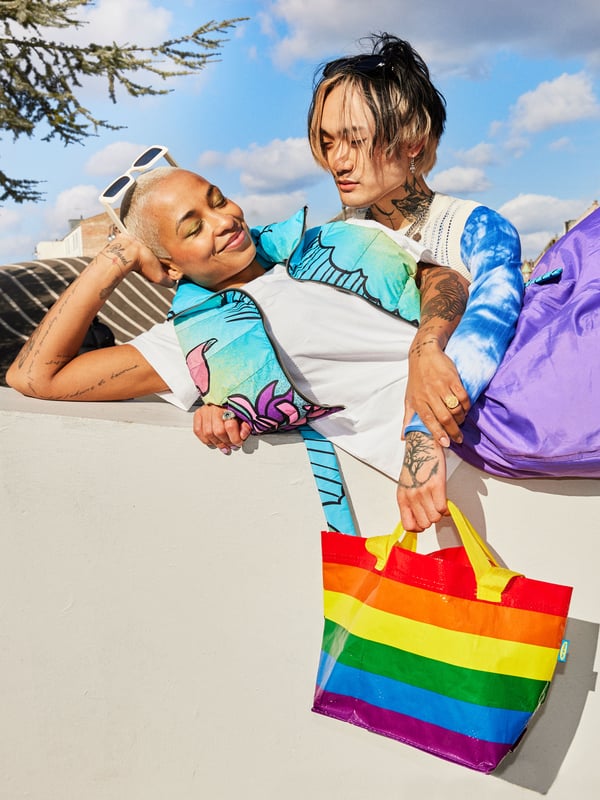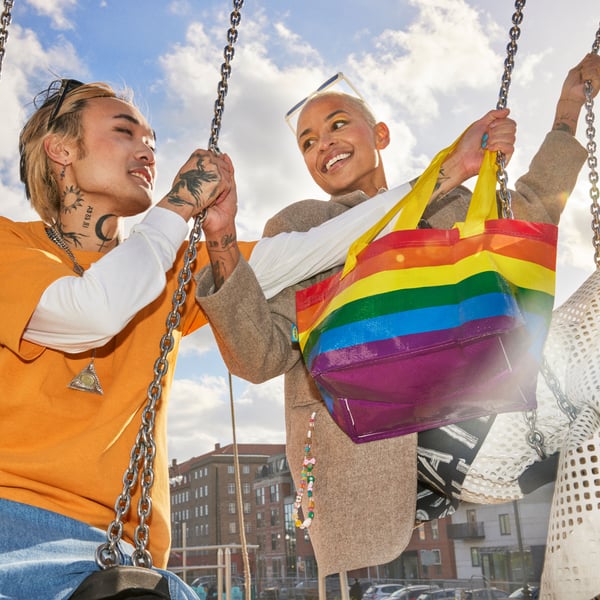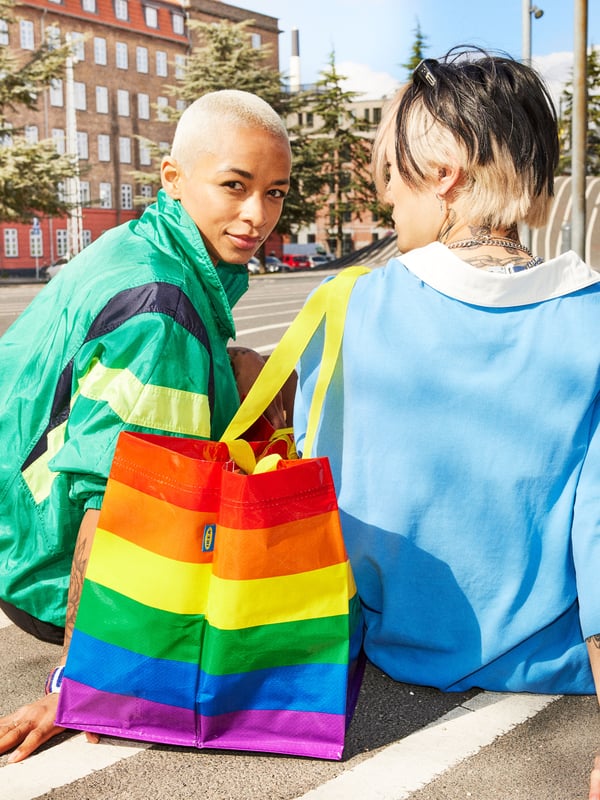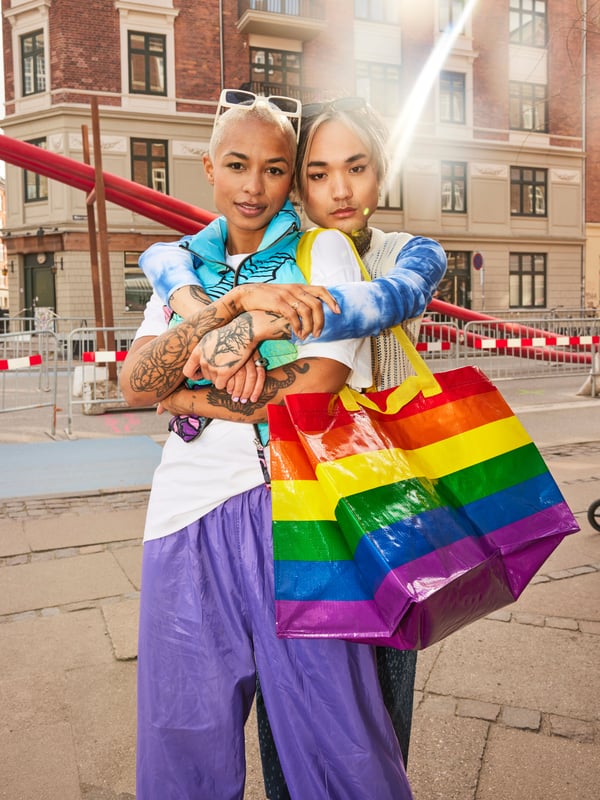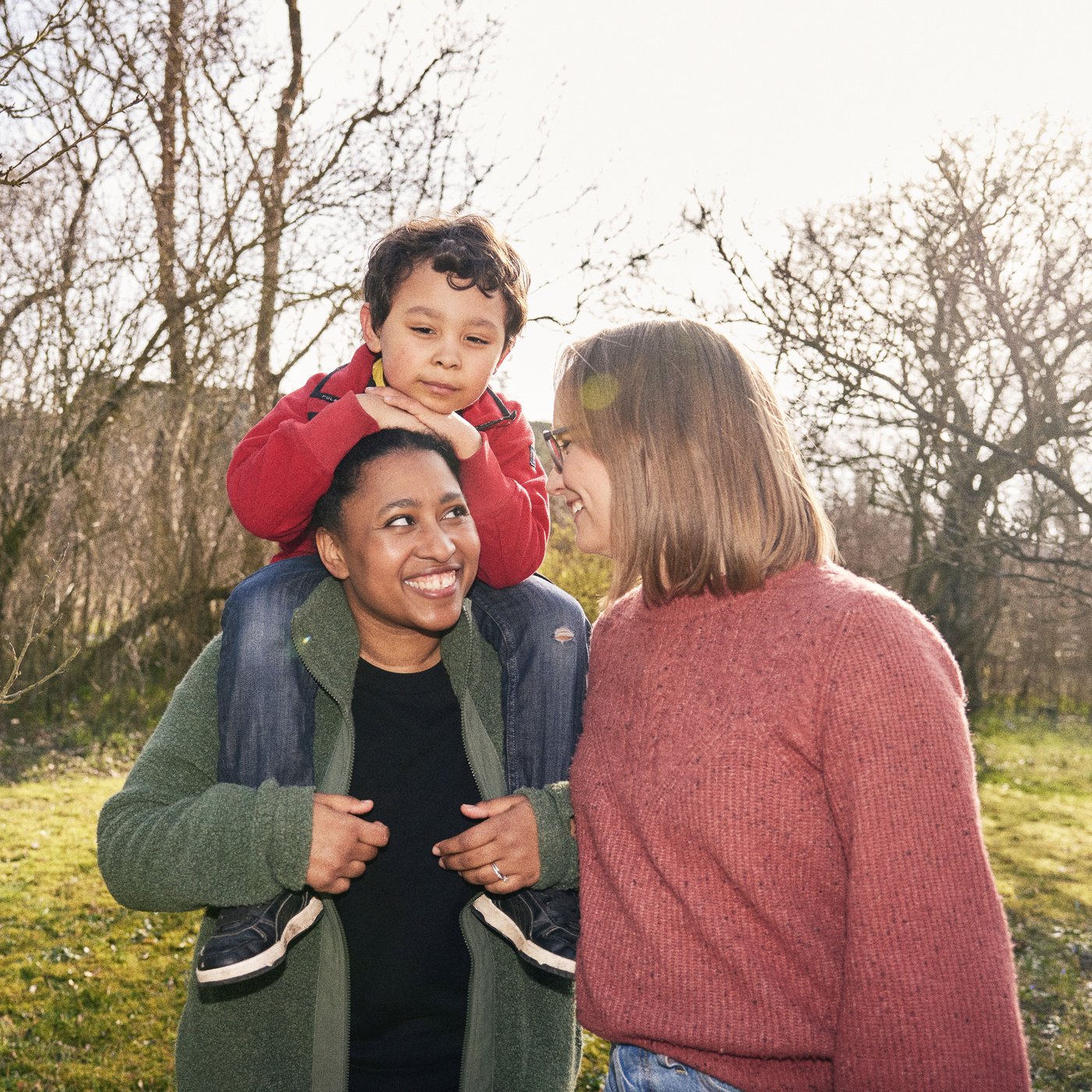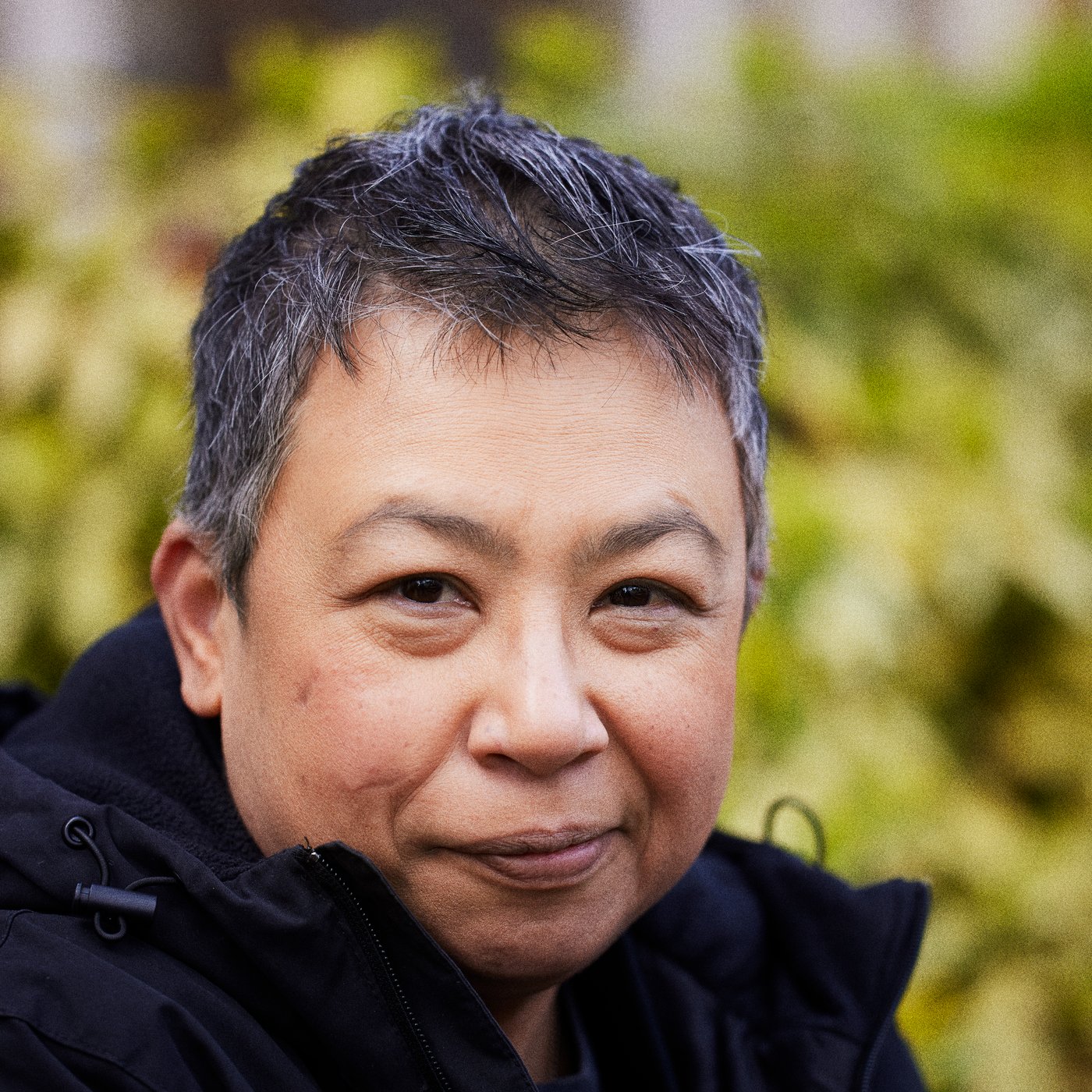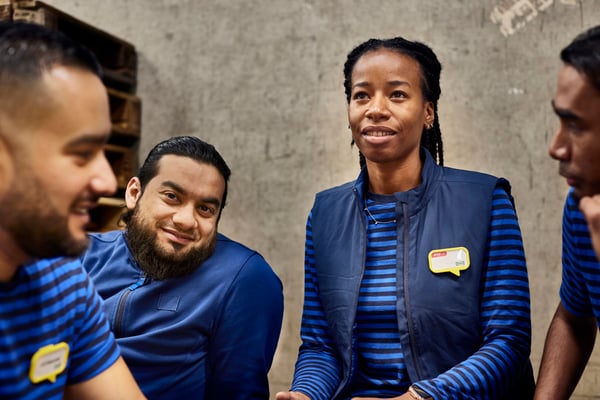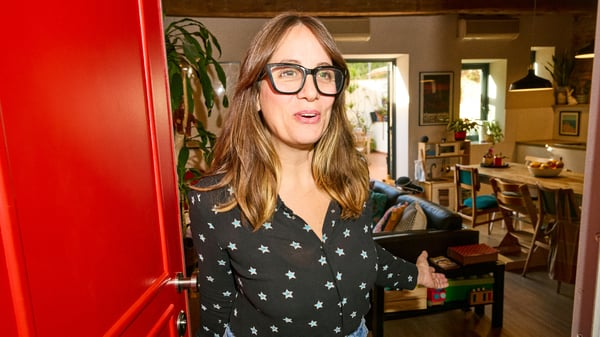LGBT+ Inclusion – Everyday Allyship
Sharing one's LGBT+ identity can be an anxious experience, but when met with love and acceptance, it can make all the difference.
We know that support at home builds self-confidence and a sense of belonging that’s carried out into the world. Not only that, support and acceptance are free ingredients.
When there’s so much to say, nothing to say, or you can’t find the words, start with a hug. (And if a hug is not wanted, just say it’s ok.)
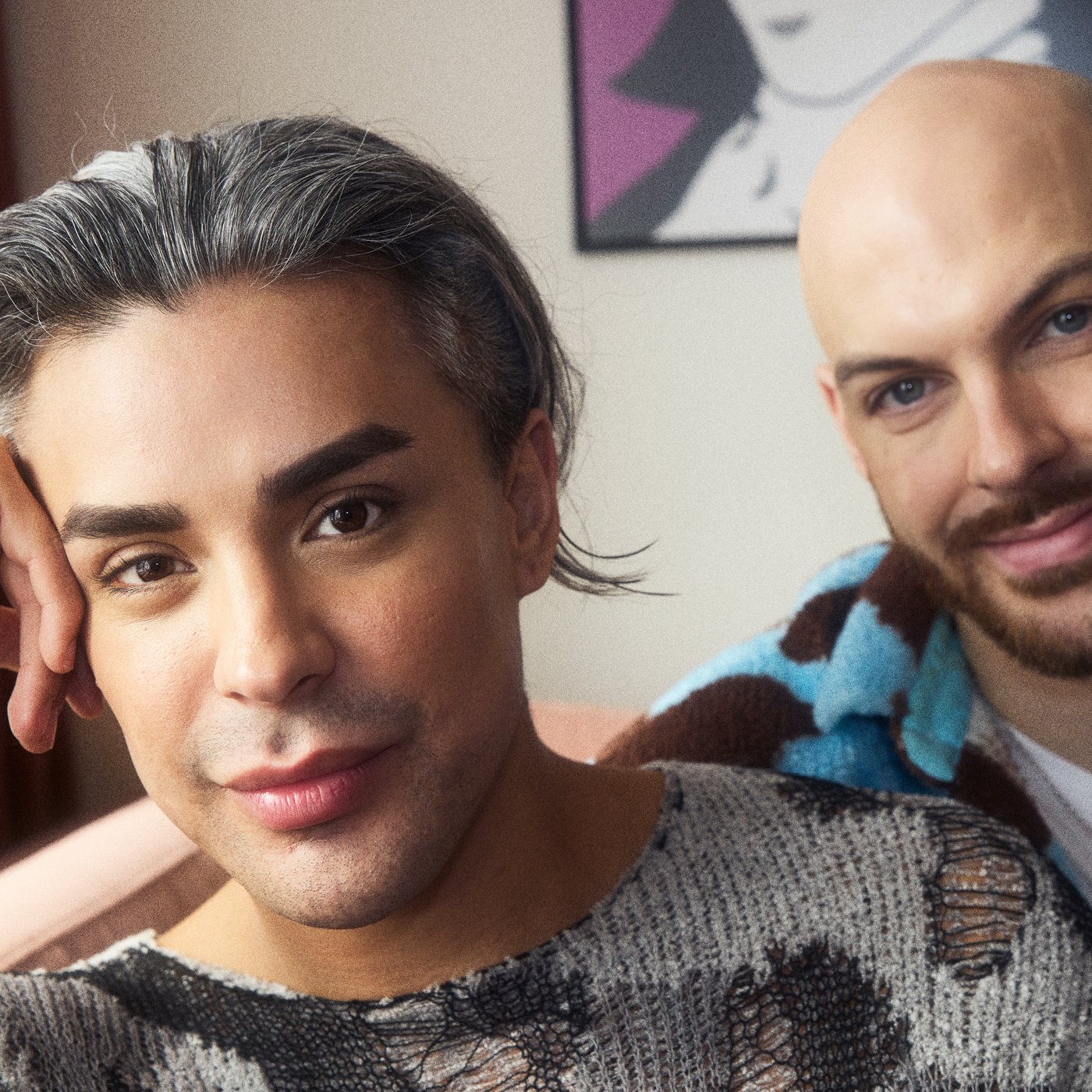

A guide for becoming an everyday ally
This guide reflects our commitment as IKEA, to creating spaces where everyone feels welcome, respected and free to be themselves. Use these tips on International Day Against Homophobia, Transphobia and Biphobia (IDAHOBIT) and, most importantly, every day to make a positive difference in the lives of LGBT+ people around you.
- Learn by Listening
There may be terms specific to the LGBT+ community that might be new to you. Take time to educate yourself about inclusive language and gaining insight into the daily challenges LGBT+ people face. When LGBT+ people share their experiences, listen actively and acknowledge what they're saying without downplaying their reality. If someone discusses discrimination or microaggressions they've faced, recognize these experiences as valid. Remember that everyone makes mistakes - if you slip up, simply acknowledge it, apologize, and move forward in a respectful way. - Use inclusive language
The words we choose can either welcome people or leave them feeling excluded. Try using terms that don't assume someone's gender or who they might love. For example, say "partner" or "spouse" instead of automatically saying "husband" or "wife" when asking about someone's relationship. Use phrases like "everyone" or "folks" rather than "ladies and gentlemen." When talking about families, remember they come in many forms – some have two moms, two dads, one parent, or other arrangements. Making inclusive language part of your everyday speech, shows consistent respect for all the different people in your life. These small changes in how you speak can help everyone feel they belong. - Be respectful
Everyone deserves dignity and respect, regardless of who they are. When interacting with LGBT+ people, approach conversations with genuine empathy and an open heart. Remember that each person's journey is unique, with challenges you might never see or fully understand. Instead of keeping your distance, take the initiative to connect through thoughtful conversation. Ask questions that show you care about their experiences and listen with the intention to understand rather than respond. These small gestures of respect create the foundation for meaningful relationships and spaces where everyone belongs. - Respond to hurtful comments
Words carry weight, even when people don't intend harm. When you hear someone using LGBT+ terms in negative ways or making inappropriate jokes that target LGBT+ people, taking a moment to address it makes a difference. Calmly explain why such comments or jokes are harmful and offensive. Beyond addressing the moment, check in privately with LGBT+ people who have faced these challenges to offer support. Most people appreciate the opportunity to learn and do better, while those affected value knowing they're not facing these situations alone. Your intervention helps create an environment where everyone's identity is treated with dignity. - Own your mistakes
We're all learning and growing, and sometimes we get things wrong, like using the wrong name, pronoun, or making another mistake when interacting with LGBT+ people. Don't panic or over-apologize. Simply acknowledge what happened, offer a sincere "I'm sorry" without making excuses, and then continue the conversation with your new awareness. Impact matters more than intent – how your words affect someone is often more important than what you meant to say. Most people appreciate the honesty of an apology and the respect shown by learning from the experience. Our willingness to own our mistakes creates space for authentic connections. - Inspire others
Being an effective ally starts with our own understanding. Take time to explore resources like books, podcasts, social media accounts, and websites created by LGBT+ people that explain their lived experiences. Pay particular attention to the specific challenges faced by LGBT+ communities in your local area, as these can vary significantly based on laws, culture, and resources available. Make time to share what you've learned with friends and family in thoughtful conversations. This helps create wider circles of understanding and support. Join LGBT+ events like Pride parades and community gatherings. Presence shows solidarity and helps inspire others in allyship. Remember that learning is ongoing – as language and understanding evolve, continue to refresh your knowledge through diverse LGBT+ voices and perspectives. - Uplifting diverse voices
LGBT+ people from different backgrounds have different life stories. Try to find books, videos, podcasts, and social media by LGBT+ people from many cultures and situations. Look especially for voices that are not often heard. When people share how their ethnicity, religion, ability, or age affects their LGBT+ experience, listen carefully. Give these voices space to be heard in conversations without interrupting. When you learn something new, remember to thank the person who shared it and share their work respectfully. The more different voices you listen to, the better you will understand the many ways people live as LGBT+ around the world. - See the whole person
Being LGBT+ is just one part of who someone is. People also have different backgrounds, abilities, beliefs, and cultures that shape their lives. When these different parts come together, they create unique experiences. For example, an LGBT+ person might also face challenges related to their ethnicity, disability, age, religion or more. These different aspects of identity don't exist separately–they work together to shape how each person experiences the world. When you support LGBT+ people, remember to recognize and respect all parts of who they are. This understanding helps us to understand the unique ways in which we each experience the world. - Respect names and pronouns
Names and pronouns are important to people's identity. Using the wrong ones can make someone feel unseen or disrespected. If you're not sure which pronouns someone uses, it's okay to politely ask if they feel comfortable sharing. This simple act of respect makes a big difference in helping people feel welcome and valued for who they truly are. If you make a mistake, apologize, correct yourself, and continue the conversation. Avoid making assumptions based on how someone looks – gender expression doesn't always tell you which pronouns a person uses. This simple act of using the right names and pronouns helps create spaces where transgender and non-binary people feel seen and valued. - Avoid assumptions
We all naturally make quick judgments based on appearance, but these are often untrue. Someone's clothing, voice, mannerisms, or relationship status doesn't reveal their sexual orientation or gender identity. Instead of guessing, create space for people to share who they are on their own terms. Use gender-neutral language when meeting new people and ask open questions that don't presume anything about their lives or relationships. This respectful approach helps everyone feel seen for who they truly are, not just how they appear at first glance. - Support gender diversity
Transgender people often face unique challenges in their daily lives. When a transgender person shares their experiences with you, listen without questioning what they're saying. Notice the everyday activities you might take for granted – using public restrooms, getting healthcare, or updating official documents, that can be difficult barriers for many transgender people. Small gestures of kindness matter too. A warm smile or a friendly conversation can provide a moment of relief for someone who may face unwelcome stares or comments. Remember that being a good ally isn't just about words–it's about actions that help create positive change. This includes making all spaces welcoming, whether at work, social gatherings, or in your community. Your consistent support helps transgender people feel valued and respected for who they truly are.
How IKEA takes action for the LGBT+ community
IKEA has been a long-standing advocate in its efforts to make people within the LGBT+ community feel welcomed, respected, and appreciated for who they are. In 1994, an IKEA commercial on TV featured a male couple searching for the right dining room table. Widely believed to be one of the earliest LGBT+ advertisements, the commercial made headlines around the world.
As an employer, our LGBT+ inclusion approach and policies help us create an inclusive workplace where LGBT+ co-workers feel welcome, safe and valued. We know there is still much work to be done and will continue focusing on equal opportunities at work, as well as championing equality at home.
- IKEA CZECHIA/HUNGARY/SLOVAKIA: Advocating for change in society. Czechia: Signed an open letter to the prime minister to support equal marriage, Slovakia: One of the initiators of a letter signed by 66 big companies and addressed to the government to stop hate and polarization against LGBT+ people.
- IKEA UK & IRELAND: Gave proceeds from the sale of the “Rainbow Cake” to external partner Switchboard LGBT+ Helpline, which was established in 1974 and provides support and information to the LGBT+ community.
- IKEA NETHERLANDS: Now offers co-workers who are undergoing gender-affirming care the possibility of taking a maximum of 24 weeks of paid leave to use over a period of 10 years, for medical and non-medical procedures.
- IKEA AUSTRALIA: Introduced paid gender-affirming care leave for co-workers and inclusive parental leave policies including fertility treatment. Made donation to LGBT+ youth charity around IDAHOBIT and published a pronouns guide.
- IKEA ITALY: On May 17, 2023, IKEA Italy announced that it will now provide co-workers going into gender affirmation six weeks of paid gender affirmation leave. Introduction of policy ensuring an increasingly inclusive working environment for transgender people working in the company.
- IKEA GERMANY: We celebrate Pride in various cities with about 500 participants. We provide information to queer parents about same status for parental leave. Signed a positioning paper to the government on: LGBT+ blood donation and Selbstbestimmungs Act.
- IKEA SWITZERLAND: Replaced maternity and paternity leave with parental leave that includes same-sex couples. This followed the active participation in the public debate prior to the national vote on extended paternity leave and marriage for all.
- IKEA US and IKEA CANADA: Have both begun implementation of the Chosen Name Project which enables trans and non-binary co-workers to use their chosen name on the company’s digital platforms.
- IKEA US has expanded benefits to now include reimbursement for travel expenses for medical procedures related to gender affirmation care when the services are not available within a reasonable distance of a co-worker’s home.
- IKEA CANADA: We are celebrating IDAHOBIT and Pride in five major cities in Canada and raising the Progress Flag in all units. We are donating proceeds from STORSTOMMA bags to LGBT+ organizations. We have introduced pronoun name tags.
- IKEA JAPAN: For the first time we raised the Progress Pride flag outside all units in Japan during April – May for Japan’s biggest Pride event and IDAHOBIT.
- IKEA FRANCE: Officially signed the commitment charter of L’Autre Cercle, a French organisation working to enhance LGBT+ inclusion in the workplace. They also established “IKEA Pride France”, a resource group for our French co-workers.
- IKEA SERBIA recently launched, together with other companies in the country, the Equality Business Alliance, a unique alliance of companies aiming to advance LGBT+ equality in the workplace and society.
- IKEA SPAIN: The benefits policy has been without sexual orientation discrimination and since 2022, we have been running annual awareness campaigns with co-workers for PRIDE month, plus donating proceedings form the sale of the STORSTOMMA bag.

